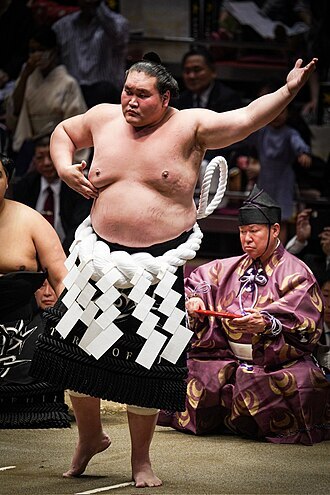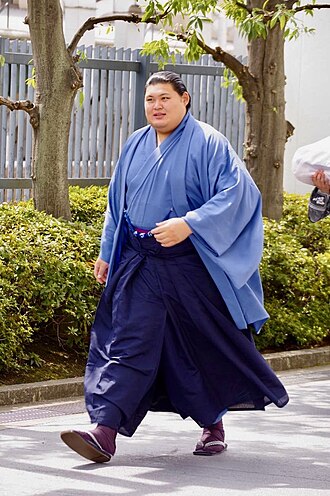Takerufuji Mikiya, born as Ishioka Mikiya in 1999, loves sumo. He does amateur fights at university, where he finds Ōnosato Daiki, 2000, formerly known as Nakamura Daiki, the most prominent young fighter in top-level sumo today, a worthy rival.
It’s 2017, Terunofuji Haruo, born in Ulaanbaatar, Mongolia, as Gantulgyn Gan-Erdene in 1991, is a top-level ōzeki, the second highest sumo range. He is strong as a monster, lifting other fighters and carefully placing them out of the dohyō, the sumo “ring”, almost without resistance. He is an absolute display of strength, but he’s not immune to injury. After several knee injuries and health problems, he is not able to fight for so long he is relegated to lower sumo ranges, forced to fight in a lower division each competition he misses. He is forced to start in jonidan when he returns in 2019. That’s the fifth division in sumo.

Terunofuji is back in business. During his first competition after the return he secures the promotion to the sandanme, next he is promoted to makushita. Two makushita competitions later, with a 6-1 record, he wins the makushita competition with an amazing 7-0, securing the promotion to jūryō, which he also wins (13-2) once and has a very good performance next (10-5). He’s back in makuuchi, the top level division. It’s 2020.
During the first top-level division competition after his return, Terunofuji wins the competition (13-2), also obtaining the special prizes for Outstanding Performance and Technique. One year later, he is back at ōzeki range, winning three of the six competitions he took part in during the year, and being in the runner-up on five of them. After a great performance (14-1) he is promoted to yokozuna, the highest range in sumo, reserved only for the grandmasters of the sport. In 2021, after a two-year comeback, he became the 73rd yokozuna in the recorded sumo history (since 1798).
The young Takerufuji, who is still fighting in amateur sumo, decides to make the jump to professional, inspired by Terunofuji‘s comeback. In November 2022, he wins (7-0) his first jonokuchi competition, the lowest division in sumo. He is promoted to jonidan, that he also wins (7-0). Next he makes a great performance in sandanme (6-1) and is promoted to makushita where he obtains very good results (6-1, 6-1, 5-2 and 6-2) and is finally promoted to jūryō, the second division. Now, he can consider himself a proper professional. It’s January 2024. Only a little bit more than a year passed since he started his professional attempt.

Ōnosato Daiki has also made his bet. In May 2023 he started at makushita level, as he was a top fighter in amateur sumo, he could skip lower divisions. After two good performances in makushita (6-1 and 4-3) he is promoted to jūryō and continues to perform at the same level (12-3 and 12-3) and is finally promoted to the top division, with a maegashira 15 range, in January 2024. In less than a year, thanks to his exceptional strength and technique, Ōnosato signs the third-fastest to reach the top division since 1989. He was so fast, his hair hasn’t grow enough yet to tie in a chonmage, the mandatory sumo hairstyle.

While Ōnosato is doing a great performance in his top division debut, in January 2024, ending with a great 11-4 record, Takerufuji is almost unstoppable in jūryō, winning the championship with an excellent 13-2 record and being thus promoted to the top-level division, where both young fighters would meet, again since their amateur times, in March.
It’s March 2024, and the time has come. Both Ōnosato and Takerufuji have a great start, with 0 losses the sixth day. After the first two thirds of competition, the tenth day, both arrive with very good numbers: Ōnosato with a 8-1 after his loss against Ōnoshō the seventh day and Takerufuji has a surprising non-loss streak, very rare on first division debutants, 9-0 that is.
Both having a similar range, and a very good record, are paired together. Ōnosato is 40 kilograms heavier, he is very strong and his technique is sharp. Takerufuji is 8 centimeters shorter, and strong as a truck. In their first duel in the sumo top division, hopefully from many, Ōnosato is blasted out of the ring, and Takerufuji obtains his 10-0. Since the 15-day tournament format was established in 1949, only the yokozuna Taiho conquered an eleven-win streak in his first top-level competition.
Next day, Takerufuji fights Kotonowaka, a young fighter at the ōzeki range, winning the fight and matching Taiho‘s record. After this, he demonstrated he could challenge the hardest fighters in the competition. Next day Hōshōryū comes, the young Mongolian fighter is one of the most feared in the ōzeki range. Hōshōryū is fast, strong and his technique, based on traditional Mongolian wrestling, bökh, is both accurate and hard to defend against.
After a very intense start, Hōshōryū lands a perfect technique and throws Takerufuji out of the dohyō, putting an end to the 11 win streak, but not yet to the competition.
The 14th fight comes and Takerufuji has a 12-1 record, the best from all the participants. This time loses against Asanoyama injuring his ankle right at the beginning of the fight. 12-2 that is, and everybody is afraid he won’t compete the last day, as he couldn’t walk in his way out.
The last day of the competition starts, Takerufuji, with his 12-2 is one win away from the next fighter, Ōnosato, who secured a great 11-3 record and is one win away from the next in the list: Hōshōryū.
Takerufuji has an injured ligament, and his master has advised him not to fight. Nobody knows what would happen. When his turn comes, he walks to the center of the dohyō with a bandage in his right ankle. Even if he loses he would still have chances to win the tournament if Ōnosato loses his fight against Hōshōryū, but we all know he will try to win this fight against Gōnoyama, his spirit is one of a warrior.
Gōnoyama, a great fighter (10-4 at the fight), has a great start, almost dropping Takerufuji, when he put too much weight in his injured ankle. But Takerufuji holds in place, grabs Gōnoyama‘s mawashi and push, push, push until he is out. Takerufuji wins the competition and becomes the second fighter that wins the makuuchi competition as a debutant since Ryogoku, who won the summer tournament of 1914, that’s 110 years.
The tournament continues, as some fights are left. Ōnosato has to fight Hōshōryū, the only sumo that was able to win against an uninjured Takerufuji. In a spectacular display of technique and flexibility, Hōshōryū throws Ōnosato out of the dohyō. 11-4 for Ōnosato in the end, signing a great competition and also wining fighting spirit and technique special prices.
Takerufuji, also received all possible special prices: fighting spirit, outstanding performance and technique; and he is honored as the great warrior he is. His name is now written in sumo history forever.
Many have no doubt that Takerufuji, Ōnosato, and probably Hōshōryū, will become great yokozunas one day, but sadly, the only one we have now, the inspiration for this huge accomplishment, Terunofuji, was out of the competition, after a very poor start, due to his injuries and health problems at his 32 years of age.